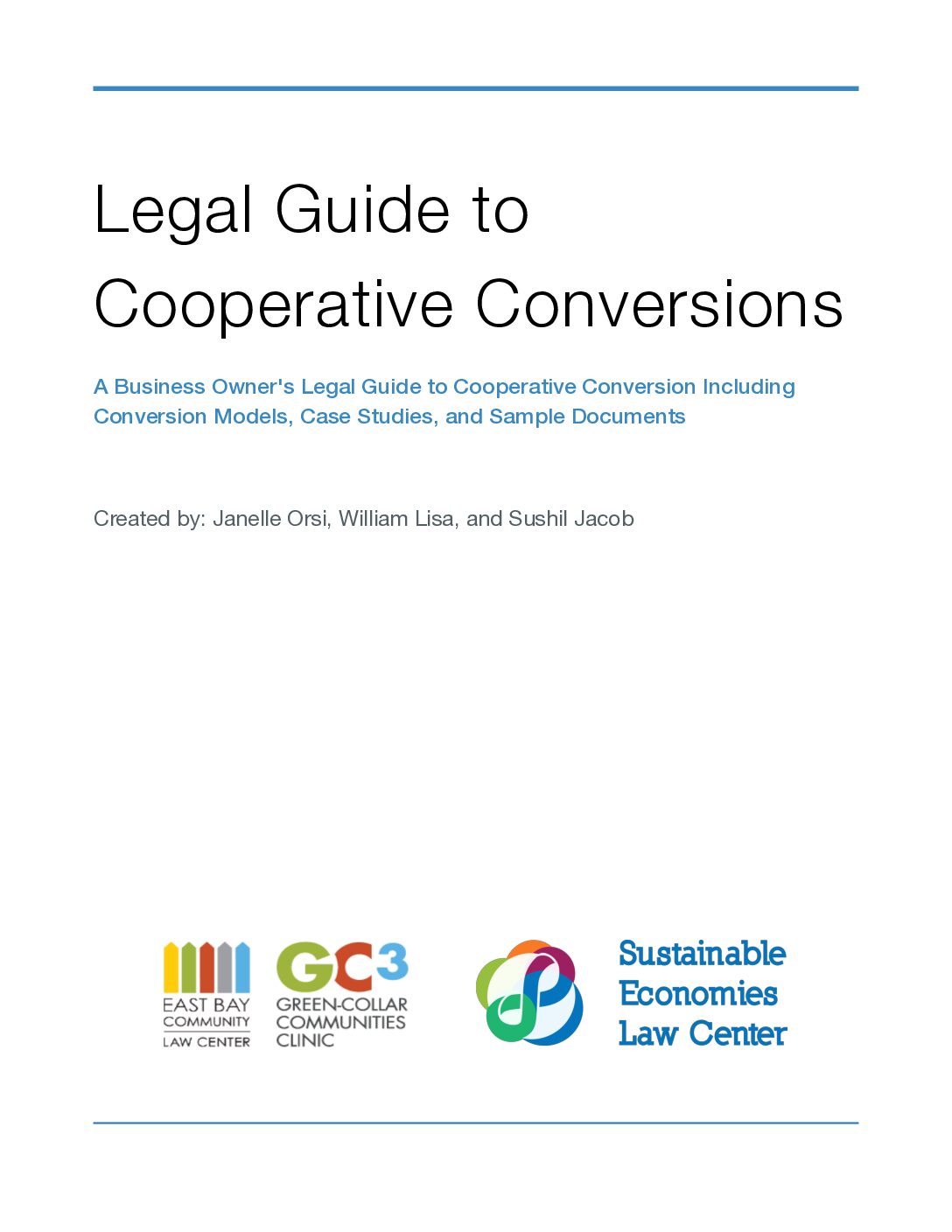Legal Guide to Cooperative Conversions

Benefits of Cooperative Conversion
Converting non-cooperative businesses to cooperatives is an empowering decision for workers and consumers, and a realistic and sound business choice. For many reasons, cooperatization may be an attractive option for consumers, workers, current owners, and the communities in which the enterprise is embedded.
Converting to a cooperative is good for the enterprise. Cooperatization can…
- Maximize innovation through collaborative teams of high-impact individuals
- Attract, retain, and reward talented individuals by distributing risk while offering direct participation in governance and surplus
- Generate wide community buy-in, thus increasing the longevity of the enterprise
- From the Ohio Employee Ownership Center: “The General Accounting Office’s . . . found that the combination of employee ownership and employee participation yielded substantial improvements in firm performance . . . Numerous research studies . . . indicate [a] direct and positive correlation between high levels of employee participation . . . and increased performance and production.”
Converting to a cooperative is good for the existing owner. Cooperatization can…
- Streamline an owners’ exit and maximize privacy of the transaction.
- Help an exiting owner rest easy knowing her/his venture is being stewarded by experienced, competent, invested individuals.
- Enable the existing owner to sell at a control premium
- Let the existing owner take advantage of the 1042 Rollover (to shelter their capital gains from taxation)
- Let the existing owner continue working for the business and receive internal capital allocations annually or just remain more passively involved as a debt or equity financer.
Converting to a cooperatives is good for the community within and around the enterprise. Cooperatization can…
- Distribute risk and maximize institutional and community independence
- Satisfy unmet social, economic needs and correct market failures
- Provide true community ownership, buffering communities from impact of outsourcing and market centralization
- Generate, circulate, and retain community wealth
A Business Owner’s Legal Guide to Cooperative Conversion
Including Conversion Models, Case Studies, and Sample Documents
Created by Janelle Orsi, William Lisa, & Sushil Jacob
of East Bay Community Law Center (Green-Collar Communities Clinic) & Sustainable Economies Law Center
The Purpose of this Guide
This Guide has been prepared as a publication under an award to the Metropolitan Transportation Commission, as part of a project to increase worker-ownership for low- to moderate-income workers. We aim to provide an overview of the legal steps involved for you, a selling owner, to convert your business to employee-ownership. We provide a few models of how to convert your business, the issues raised in valuing your business, and related financing, governance and employment law considerations. Finally, we close with a few case studies that illustrate the points we raised in the guide. We hope you find this guide useful and please submit any comments or feedback to us at communications@theselc.org.
Important Disclaimers:
The research that provided the basis for this publication was supported by funding under an award to the Metropolitan Transportation Commission (MTC) from the U.S. Department of Housing and Urban Development. The substance and findings of the work are dedicated to the public. The author and publisher are solely responsible for the accuracy of the statements and interpretations contained in this publication. Such interpretations do not necessarily reflect the views of the federal government or MTC.
The contents of this handbook should not be relied on as legal advice. Some of this information could become outdated, and laws vary from place-to-place. Furthermore, although we tried to collect accurate information and give the laws our best interpretation, some information in this booklet could even turn out to be incorrect or subject to other interpretations by courts or regulators! We sure hope that’s not the case, but, what can we say? Law is complicated stuff! That’s why we strongly recommend that you consult with an attorney before using this information to form or operate a cooperative.
This handbook was written by lawyers knowledgeable primarily about California law. Although we tried to write in general terms that could be applicable across states, and although some legal matters are governed by federal tax law, anyone using this book should be aware of the necessity to research your own state’s laws.
Table of Contents
Introduction to Employee-Owned Cooperatives
The Mechanics of Cooperative Conversion
Deciding Between an Asset Sale or Entity Sale
Valuing the Business and Determining a Sales Price
Documents Required in a Cooperative Conversion
Financing Cooperative Conversion
Governance During and After Conversion
Employment Law and Worker Cooperative Conversions
The Role of Lawyers in Cooperative Conversions
Legal Case Study: Island Employee Cooperative
Legal Case Study: Select Machine
Legal Case Study: Loconomics Conversion to a Freelancer-Owned Cooperative
Legal Case Study: Real Pickles
Legal Case Study: Colorado Recovery
Sample Documents
